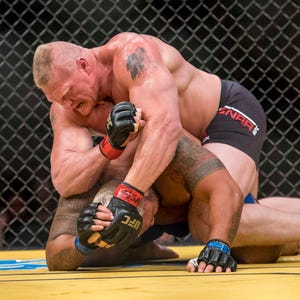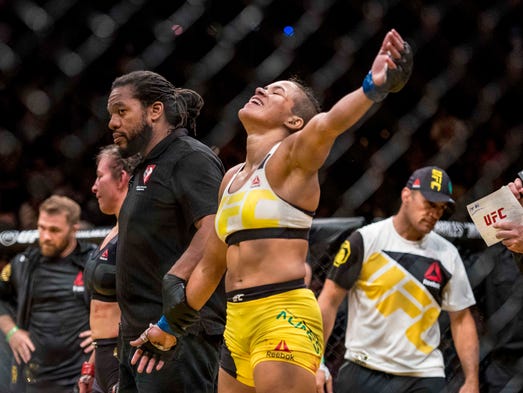Rogers: Amanda Nunes becomes UFC’s newest star as sport’s first openly gay champion – USA TODAY
LAS VEGAS – Few sports deliver upsets with such regularity as mixed martial arts, and it was perhaps fitting that the groundbreaking 200th pay-per-view of the Ultimate Fighting Championship ended with a shock.
Amanda Nunes’ first-round victory over Miesha Tate in the main event of UFC 200 was an outcome few saw coming. But it is the 28-year-old Brazilian’s story that makes it all the more remarkable.
Nunes is the first openly gay champion in the history of the UFC, clinching the belt by dominating Tate with a fierce early flurry, then causing the bantamweight champion to tap out after just 3 minutes, 18 seconds.
“This is amazing,” Nunes said, when asked by USA TODAY Sports about the significance of her achievement. Nunes has been in a relationship with partner Nina Ansaroff, also a UFC fighter, for four years. “I am so happy in my life,” she added.
During the endless months of planning and plotting and trying to stack the show with as many famous names as possible, the hierarchy at the UFC probably didn’t figure on their signature event ending with an upset win from a little-known fighter.
Nunes has around 25,000 followers on Twitter, a number that jumped greatly in the hours after she wrested the belt from Tate, the third such change of bantamweight hardware since November.
Ronda Rousey has 2.73 million followers. Conor McGregor has 1.93 million. Jon Jones has 1.36 million.
Yet, as one by one the possible star names who could have headlined this historic card fell away, it opened the opportunity for an underdog to have their day.
Rousey’s injuries, McGregor’s media demands and Jones’ positive late drug test kept the pay-per-view figures lower than they might have been, but this was not the kind of night that should be measured as such.
“200” might just be a numerical quirk, but such times are occasions to reflect on the past and analyze what progress has been made. In terms of broad, national and international interest, the strides are obvious. Along the way, UFC has also managed to add diversity and inclusiveness to its repertoire. Nunes is a fine example of that.
“To have our very first openly gay champion shows you how far this sport has come,” UFC vice president of public relations Dave Sholler said. “Amanda is an incredible ambassador. When you talk about all the great moments, having Amanda carry the flag literally and figuratively for the gay community is a seminal moment for our sport.”
The UFC is not an organization that immediately springs to mind when you think about progressiveness. Middleweight champion Michael Bisping uttered a slur at opponent Luke Rockhold after his win at UFC 199 last month, though he immediately retracted it.
When transgender fighter Fallon Fox revealed she had been born a man in 2013, heavyweight Matt Mitrione – then with the UFC – branded her a “sick, sociopathic, disgusting freak” and was given a temporary suspension.
In past years, fighters have used epithets related to homosexuality to taunt rivals. In truth, such behavior has not been entirely eliminated.
However, UFC president Dana White said in 2011 that he hoped that any gay UFC fighters would feel empowered and safe enough to come out. More recently, the company has launched an initiative called “We Are All Fighters,” aimed at promoting understanding and to benefit an LGBTQ community organization in southern Nevada.
That cause now has a powerful figurehead in the quirky, humorous and thoroughly charming Nunes, whose devastating combat skills are at odds with her regular persona.
“It is huge,” Ansaroff, a UFC strawweight with a 6-5 record, told USA TODAY Sports minutes after her partner’s triumph. “Not so much for us or the fact we are trying to get recognition as a gay couple, but for the human race as it is. People are people. They could be your neighbor, or your next UFC champion. Treat everybody the same.”
Ansaroff and Nunes live openly, regularly posting affectionate messages and photographs on social media.
“(Amanda) is pretty much the exact opposite of what everyone thinks about her,” Ansaroff said. “When I first met her, I thought, ‘This lady is crazy.’ But she is the biggest sweetheart, she will do anything for her loved ones. She always likes to have fun. The only time she is serious is when that cage door pops.”
Given that Twitter numbers are the modern currency of fame and that the UFC has built large swathes of its following through savvy social media management, Nunes was the 20th-most renowned athlete to compete on Saturday night’s stacked card.
The depth of the lineup was extraordinary. TJ Dillashaw, the No.1 contender and former champion in the men’s bantamweight division, might normally be in contention to appear in the main or co-main event of a regular pay-per-view.
Here, his contest with No. 3-ranked Raphael Assuncao was the seventh-to-last fight in a card designed to escalate in terms of significance and interest.
For some, there was a giant career leap forwards. For others, nothing but disappointment and spurned opportunity.
Cain Velasquez demolished Travis Browne in a heavyweight showdown that indicated Velasquez, the popular but oft-injured ex-champ, is very much back.
Jose Aldo was outstanding in his first appearance since losing to McGregor in 13 seconds at UFC 194, outdueling and outpointing Frankie Edgar to clinch the interim featherweight title. He will now likely get a revenge shot at McGregor later this year or early next.
Daniel Cormier easily controlled MMA legend Anderson Silva to avoid extra disappointment after seeing his main event blockbuster with Jones evaporate due to his initial opponent’s drug revelations.
And Brock Lesnar, who has spent the last five years in his natural habitat of the WWE, came back to the octagon, pocketed at least $2.5 million, and used his ground skills to smother the challenge of Mark Hunt. If he wishes to stick around, Lesnar has inserted himself firmly into the heavyweight title picture.
But the biggest winner of all was Nunes, who is now part of a women’s bantamweight division that brings all kinds of intrigue. She now sits alongside Rousey, Holm and Tate as part of a four-pronged collective at the top of the pile.
A bout between any one of the group would likely be pay-per-view headlining material. The situation should provide a long series of battles before it shakes out anything decisive — depending on when Rousey returns.
“Now I am champion,” Nunes said. “Next will be whatever, whoever, they decide to put against me. I am going to enjoy being champion.”
The UFC is so, so different now compared to its humble beginnings, where tournaments between fighters of different weights and from different disciplines would square off on a single night. Heck, it is so different from how it was at UFC 100 in 2009, when the audience was still very much niche.
Now, MMA has taken strong steps into the mainstream. Not many sports can generate the kind of buzz that engulfed Vegas this past week or secure national attention on this scale.
White, the great promoter, thinks his product can become the biggest sport in the world. To that end, there are still a vast number of people who need convincing. But it is beyond question that the UFC is an influential part of the scene, having been unafraid to move with the times and explore new avenues.
It is a brutal, punishing, sometimes bloody sport that is not for the faint-hearted. It has its detractors, but its appeal lies in the unpredictability of its ever-shifting, rarely repetitive narrative.
The new stories are compelling, few more so than that of Nunes,a gay, female fighter in a sport where not long ago gays kept silent and women didn’t fight.
After a difficult week of restructuring and drama, the UFC heads out of its big week on a roll, momentum that has been hard-earned.






























